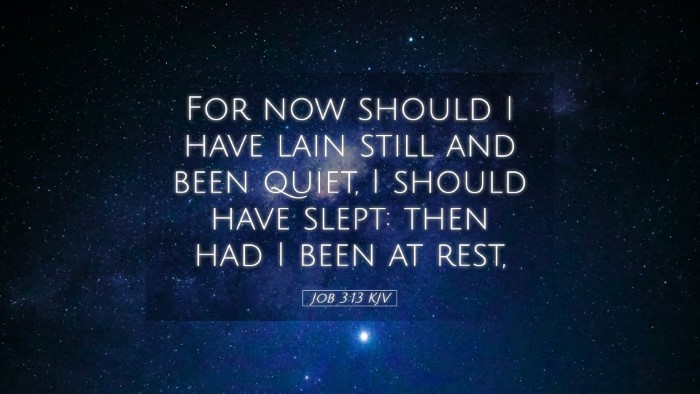Old Testament
Genesis Exodus Leviticus Numbers Deuteronomy Joshua Judges Ruth 1 Samuel 2 Samuel 1 Kings 2 Kings 1 Chronicles 2 Chronicles Ezra Nehemiah Esther Job Psalms Proverbs Ecclesiastes Song of Solomon Isaiah Jeremiah Lamentations Ezekiel Daniel Hosea Joel Amos Obadiah Jonah Micah Nahum Habakkuk Zephaniah Haggai Zechariah MalachiJob 3:13
Job 3:13 KJV
For now should I have lain still and been quiet, I should have slept: then had I been at rest,
Job 3:13 Bible Commentary
Commentary on Job 3:13
Job 3:13 states: "For now I would have lain still and been quiet, I would have slept; then had I been at rest."
This verse appears in the context of Job's lamentation as he reflects on his suffering and the state of his existence. The depth of his despair is palpable as he longs for the relief that death seems to promise. In this commentary, we will explore the insights from noted public domain commentaries, incorporating thoughts from Matthew Henry, Albert Barnes, and Adam Clarke.
Contextual Overview
Job, a man who had experienced profound loss and suffering, enters a phase of deep emotional turmoil in this chapter. After losing his wealth, health, and family, he wishes that he had never been born. This chapter is essential as it reveals the rawness of human emotion in the face of suffering.
Matthew Henry's Perspective
Despair and the Desire for Rest: Matthew Henry emphasizes Job's overwhelming despair. He points out that Job's expression of longing for the state of rest associated with death reflects a common human sentiment when faced with insurmountable suffering. Henry writes, "It is common for those in extreme pain and affliction to wish for the cessation of life." This illustrates that Job sees his current state as unbearable and longs for peace.
The Idea of Peace in Death: Henry further explains that Job's statement about resting in silence indicates his belief that death could be preferable to the anguish of life. He comments that "the grave is a place of rest for those who are weary," adding that death seems to offer a relief that life, in its misery, cannot. This illustrates a crucial theological point: the grave, while often viewed with fear, is, for Job, an escape from suffering.
Albert Barnes' Insights
The Nature of Suffering: Albert Barnes provides a detailed exegesis of this verse, highlighting Job's contemplation of death as a release from suffering. He notes, "Job seems to view his life not only as painful but devoid of purpose." Barnes suggests that Job’s extraordinary afflictions lead him to question the meaning of life itself, revealing a profound existential struggle.
The Rest That Job Longs For: Barnes comments on Job's emphasis on rest and quietness, stating that it reflects a yearning for peace amidst turmoil. He observes, "Job expresses a desire to escape his troubles by entering into that profound state of rest which comes with death." This interpretation is critical for understanding Job's mental state and the complexity of human emotions in suffering.
Adam Clarke's Reflection
Life and Its Troubles: Adam Clarke offers a distinct viewpoint on the suffering of Job, pointing out that Job's reflection on sleeping and being at rest signifies a resignation to fate. Clarke states, "He feels that his sufferings are so acute that even the peace of non-existence seems preferable." This underscores the desperate straits in which Job finds himself.
A Philosophical Inquiry into Existence: Clarke delves deeper into the philosophical ramifications of Job's words, suggesting that his lament is more than just a desire for death; it reflects a broader questioning of the justice of life itself. He posits, "In his extreme anguish, Job challenges the very nature of existence and God's role in it." This commentary invites readers to grapple with the significant theological questions that arise from Job’s plight.
Theological Implications
This passage serves as a poignant reminder of the suffering that many endure and invites theologians and students alike to delve into the complexities of divine justice and mercy. The insights from Henry, Barnes, and Clarke intertwine to paint a vivid picture of Job’s inner turmoil and the age-old struggle to find meaning amidst suffering.
- Human Suffering: The commentaries highlight the universal experience of human pain and the longing for relief.
- The Role of Faith: Despite deep despair, Job’s expressions reflect a continued grappling with faith and existence.
- Theology of Rest: Consideration of death as a form of rest prompts discussions about eschatology and the hope of redemption.
Conclusion
In combining insights from these esteemed commentators, we are reminded that Job's lament transcends his individual experience and touches upon the broader human condition. His cry for rest is a familiar call for solace that resonates across time—the struggle against suffering, the search for meaning, and ultimately, the quest for divine understanding. For pastors, students, theologians, and scholars, Job 3:13 invites deep reflection on the nature of hope and despair in the human experience.


